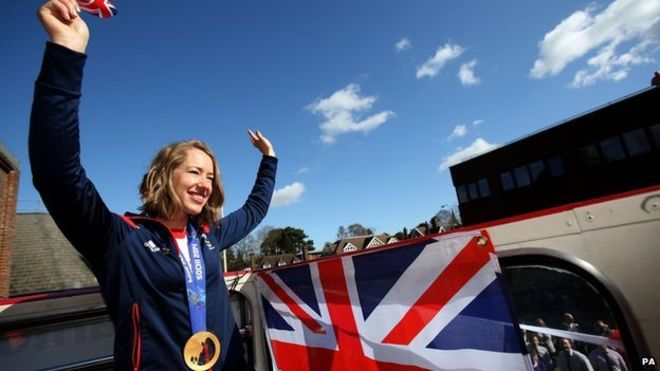
Talk about coming back with a bang.
The expectation when Lizzy Yarnold was asked whether next year’s International Bobsleigh and Skeleton Federation (IBSF) World Championships should be moved from Sochi amid allegations of state-sponsored doping in Russia was that she would give the answer we have come to expect from sportsmen and women these days.
Something along the lines of “I don’t pay much attention to that/I am just concentrating on my training/I am only focused on myself and giving my best for my country.” Or perhaps a combination of all three.
You could have forgiven the Olympic skeleton champion for not wanting to stick her head above the parapet. After all, the Briton has just returned from a prolonged period away from the track and you might have thought she would want to keep under the radar for a while as she regroups before the new season.
Not a chance. The bubbly, energetic and passionate 28-year-old not only answered the question but went on to reveal she may even boycott the World Championships, due to be held at the scene of her Sochi 2014 Olympic gold medal triumph, in February, if the IBSF choose to keep the event in Russian city.
It was an admirable stand at a time where the vast majority of athletes are often too frightened, too cautious to speak out on controversial subjects for fear of alienating the wrong person or organisation.
They remain locked in their shell, protected by an army of communications “experts” who do anything to keep their subjects from speaking anything other than the party line.

Thankfully for those of us in attendance at the British Bobsleigh and Skeleton Association’s (BBSA) press day at the Olympic Stadium in London on Monday (October 31), Yarnold broke free.
“The International Olympic Committee (IOC) and the World Anti-Doping Agency (WADA) have recommended the Championships shouldn’t be in Russia and that is something I would stand by and support,” she said.
“I hope the IBSF are going to have serious discussions about what they’re going to do.
“We know that it may be a state-sponsored doping issue and I don’t want to compete at an event where there’s not clean athletes and there’s not guaranteed anti-doping systems and questions over what’s going to happen to my samples and things like that.
“So I need to have complete confidence to compete at an event and I’m sure many athletes feel that way.
“We need to find out more, we are awaiting the second McLaren Report and then I’m going to have a proper think about it.
“If changes ahead of the Sochi World Championships I wouldn’t rule out not competing.”
Whether Yarnold lives up to the threat should the IBSF elect to take the path many of us would feel is the wrong one – keeping the competition in Sochi – when the second McLaren Report, which is likely to uncover further damning Russian revelations, is published next month is another matter.
But Yarnold, astute as she is, will know all too well that the sport’s worldwide governing body cannot afford for its star names to boycott the World Championships, for both competition and commercial reasons, and thus her speaking out puts automatic pressure on the IBSF to make the right call. Her words shift the ball firmly back into their court.
Both Yarnold and the IBSF have the same goal – to compete at a World Championships at which the anti-doping program can be guaranteed. The Briton believes such a guarantee cannot be made in Sochi.
“I don’t want to compete at an event where there’s not clean athletes and there’s not guaranteed anti-doping systems and questions over what’s going to happen to my samples and things like that,” she said.
Her motives for the public ultimatum are largely irrelevant. What matters is that a high-profile name, an Olympic champion and an athlete who is considered a great role model has felt the need to talk so candidly on the omnipresent topic of doping in sport. There just has not been enough of that in recent months.
Of course, she is not the first to do so – American swimmer Lilly King openly criticized Russian rival Yuliya Efimova’s inclusion at the Olympic Games in Rio de Janeiro – but Yarnold’s comments felt seismic in their nature. They were a direct warning to the IBSF and indeed to other Federations who are sweating on the correct course of action with the release of the Canadian lawyer’s latest findings looming large.
Yarnold, who has been rightly praised for her stance, may have purely been putting out a feeler to see if others would follow her lead, throwing mud at the wall to see what sticks. If the early response is anything to go by, the scrutiny on the Winter International Federations who have upcoming or planned events in Russia is only going to increase.
Belgium’s Kim Meylemans may not have the star quality of Yarnold but her support of the Briton and her viewpoint was plain to see. The 20-year-old described the reigning Olympic champion as a “hero”, before going on to insist she too would snub the Sochi World Championships because she “can’t support state sponsored doping, cheating and homophobia as an athlete and as a person.”
Others among the bobsleigh and skeleton fraternity must surely feel the same way. Let us not forget the only IOC member at the pre-Rio 2016 Session in August to raise their hand when President Thomas Bach asked the room if they disagreed with the Executive Board’s decision not to ban the entire Russian team from the Olympic Games was Adam Pengilly, a British former skeleton athlete.
What the IBSF will hope does not happen is that the stance taken by Yarnold and Meylemans prompts a mass exodus of athletes from the World Championships if they opt not to move the event. That, however, seems to be the only way for the Winter International Federations to stand up, take notice and finally go about taking concrete action rather than hiding behind the usual platitudes freely distributed by the ruling IOC.
Granted, there are some, such as the International Ski Federation, who have refused to rule out stripping international events from Russia. The polar opposite attitude of others, however, such as the International Biathlon Union – who gave Tyumen the World Championships in September – indicates their opinions about how to solve a problem like Russia are worlds apart.
After all, the Winter International Federations and the IOC are equally to blame with the mess we find ourselves in concerning holding major events in Russia. This has been a longstanding bugbear of many after the governing bodies were initially urged to “freeze preparations” for major competitions in the country and to “actively seek alternative organizers.”
The IOC then backtracked, telling them this ruling only applied to future Russian candidacies and not bid processes which are already underway or competitions that have already been awarded to the nation.
It is for this reason that, despite the threats from Yarnold and Meylemans – and any other athlete who wishes to take the same bold and courageous step – it appears unlikely at this point that they will get their wish as Sochi was given the event in question back in 2013.
Just ask Russian Bobsleigh Federation President Alexander Zubkov, who dismissed claims the World Championships should be relocated – although this was coming from a man who is accused of involvement in the state-sponsored sample-switching at Sochi 2014, where he won two gold medals, and who was then elected as head of the RBF shortly after.
But if, as many seem to think will be the case, McLaren returns with further evidence, do the Winter International Federations really have a leg to stand on? Can they really hold a major event in Russia in the current climate?
Once again, the main demographic which is suffering is the athletes. They are approaching the new campaign with a dark cloud of uncertainty hanging over their sport’s flagship event.
We are forever being told that athletes are at the heart of sport, but the last year or so has torn that mantra to shreds. It was politics which saw Russian competitors being cleared to represent their country at Rio 2016. It was politics which has seen perhaps hundreds of athletes denied their chance at Olympic glory by those who have cheated the system.
Politics is also the only thing keeping these Federations from taking action against Russia. The only thing that can reverse this trend is for the athletes themselves to take a stand.
As British Bobsleigh performance director Gary Anderson put it, “I feel the time has come that we do start to speak out a little bit about this because other people are and silence doesn’t help anybody in this case.”
That silence has, unfortunately, become synonymous with the IBSF and the vast majority of their Winter Olympic counterparts. It may be up to the likes of Yarnold to maintain the verbal threats to show the federations the true meaning of actions speaking louder than words.
By Liam Morgan
Republished with permission from insidethegames.biz.